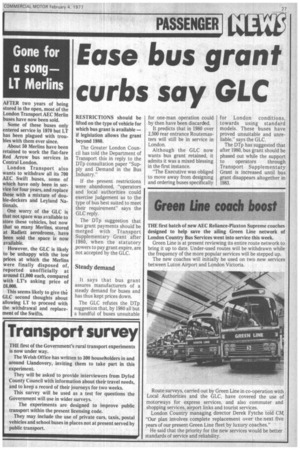Ease bus grant curbs say GLC
Page 29

If you've noticed an error in this article please click here to report it so we can fix it.
RESTRICTIONS should be lifted on the type of vehicle for which bus grant is available — If legislation allows the grant beyond 1980.
The Greater London Council has told the Department of Transport this in reply to the DTp consultation paper "Supply and Demand in the Bus Industry."
If the present restrictions were abandoned, "operators and local authorities could exercise judgement as to the type of bus best suited to meet their requirement" says the GLC reply.
The DTI) suggestion that bus grant payments should be merged with Transport Supplementary Grant after 1980, when the statutory powers to pay grant expire, are not accepted by the GLC.
Steady demand
It says that bus grant assures manufacturers of a steady demand for buses and has thus kept prices down.
The GLC refutes the DTp suggestion that, by 1980 all but a handful of buses unsuitable for one-man operation could by then have been discarded.
It predicts that in 1980 over 2,500 rear entrance Routemasters will still be in service in London.
Although the GLC now wants bus grant retained, it admits it was a mixed blessing in the first instance.
"The Executive was obliged to move away from designing and ordering buses specifically for London conditions, towards using standard models. These buses have proved unsuitable and unreliable," says the GLC.
The DTp has suggested that after 1980, bus grant should be phased out while the support to operators through Transport Supplementary Grant is increased until bus grant disappears altogether in 1983.
































































































































